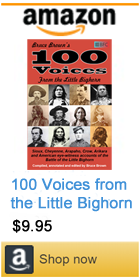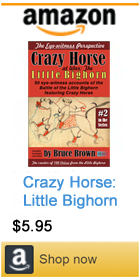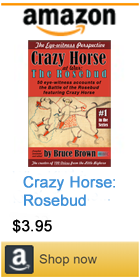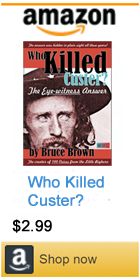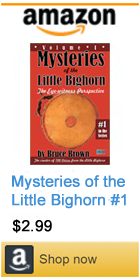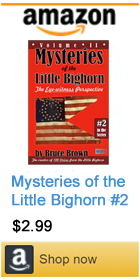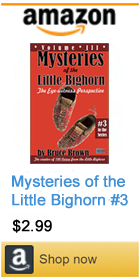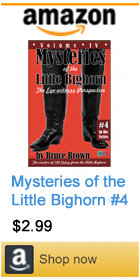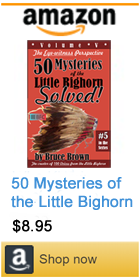|
||||||||||||
Bruce Brown's 100 Voices... Iron Hawk's Story of the Battle, #2
IRON HAWK'S ACCOUNT
Our horses stampeded down toward the Minneconjous, but we rounded them up again and brought them back. By now warriors were running toward the soldiers, and getting on the ponies, and many of the Hunkpapas were gathering in the brush and timber near the place where the soldiers had stopped and got off their horses. I rode past a very old man who was shouting: "Boys, take courage! Would you see these little children taken away from me like dogs?" I went into our tepee and got dressed for war as fast as I could; but I could hear bullets whizzing outside, and I was so shaky that it took me a long time to braid an eagle feather into my hair. Also, I had to hold my pony's rope all the time, and he kept jerking me and trying to get away. While I was doing this, crowds of warriors on horses were roaring by up stream, yelling: "Hoka hey!" Then I rubbed red paint all over my face and took my bow and arrows and got on my horse. I did not have a gun, only a bow and arrows. When I was on my horse, the fight up stream seemed to be over, because everybody was starting back downstream and yelling: "It's a good day to die!" Soldiers were coming at the other end of the village, and nobody knew how many there were down there. A man by the name of Little Bear rode up to me on a pinto horse, and he had a very pretty saddle blanket. He said: "Take courage, boy! The earth is all that lasts!" So I rode fast with him and the others downstream, and many of us Hunkpapas gathered on the east side of the river at the foot of a gulch that led back up the hill where the second soldier band10 was. There was a very brave Shyela with us, and I heard someone say: "He is going!" I looked, and it was this Shyela. He had on a spotted war bonnet and a spotted robe made of some animal's skin and this was fastened with a spotted belt. He was going up the hill alone and we all followed part way. There were soldiers along the ridge up there and they were on foot holding their horses. The Shyela rode right close to them in a circle several times and all the soldiers shot at him. Then he rode back to where we had stopped at the head of the gulch. He was saying: "Ah, ah!" Someone said: "Shyela friend, what is the matter?" He began undoing his spotted belt, and when he shook it, bullets dropped out. He was very sacred and the soldiers could not hurt him. He was a fine looking man. We stayed there awhile waiting for something and there was shooting everywhere. Then I heard a voice crying: "Now they are going, they are going!" We looked up and saw the cavalry horses stampeding. These were all gray horses. I saw Little Bear's horse rear and race up hill toward the soldiers. When he got close, his horse was shot out from under him, and he got up limping because the bullet went through his leg; and he started hobbling back to us with the soldiers shooting at him. His brother-friend, Elk Nation, went up there on his horse and took Little Bear behind him and rode back safe with bullets striking all around him. It was his duty to go to his brother-friend even if he knew he would be killed. By now a big cry was going up all around the soldiers up there and the warriors were coming from everywhere and it was getting dark with dust and smoke. We saw soldiers start running down hill right towards us. Nearly all of them were afoot, and I think they were so scared that they didn't know what they were doing. They were making their arms go as though they were running very fast, but they were only walking. Some of them shot their guns in the air. We all yelled " Hoka hey!" and charged toward them, riding all around them in the twilight that had fallen on us. I met a soldier on horseback, and I let him have it. The arrow went through from side to side under his ribs and it stuck out on both sides. He screamed and took hold of his saddle horn and hung on, wobbling, with his head hanging down. I kept along beside him, and I took my heavy bow and struck him across the back of the neck. He fell from his saddle, and I got off and beat him to death with my bow. I kept on beating him awhile after he was dead, and every time I hit him I said "Hownh!" I was mad, because I was thinking of the women and little children running down there, all scared and out of breath. These Wasichus wanted it, and they came to get it, and we gave it to them. I did not see much more. I saw Brings Plenty kill a soldier with a war club. I saw Red Horn Buffalo fall. There was a Lakota riding along the edge of the gulch, and he was yelling to look out, that there was a soldier hiding in there. I saw him charge in and kill the soldier and begin slashing him with a knife. Then we began to go towards the river, and the dust was lifting so that we could see the women and children coming over to us from across the river. The soldiers were all rubbed out there and scattered around. The women swarmed up the hill and began stripping the soldiers. They were yelling and laughing and singing now. I saw something funny. Two fat old women were stripping a soldier, who was wounded and playing dead. When they had him naked, they began to cut something off that he had, and he jumped up and began fighting with the two fat women. He was swinging one of them around, while the other was trying to stab him with her knife. After awhile, another woman rushed up and shoved her knife into him and he died really dead. It was funny to see the naked Wasichu fighting with the fat women. By now we saw that our warriors were all charging on some soldiers that had come from the hill up river to help the second band that we had rubbed out. They ran back and we followed, chasing them up on their hill again where they had their pack mules. We could not hurt them much there, because they had been digging to hide themselves and they were lying behind saddles and other things. I was down by the river and I saw some soldiers come down there with buckets. They had no guns, just buckets. Some boys were down there, and they came out of the brush and threw mud and rocks in the soldiers' faces and chased them into the river. I guess they got enough to drink, for they are drinking yet. We killed them in the water. Afterwhile it was nearly sundown, and I went home with many others to eat, while some others stayed to watch the soldiers on the hill. I hadn't eaten all day, because the trouble started just when I was beginning to eat my first meal. Black Elk Speaks: The Life Story of a Holy Man of the Ogalala Sioux, by Black Elk with John G. Neihardt (Flaming Rainbow), p 92 - 95
Although barely a teenager at the time, Iron Hawk fought in both the Battle of the Rosebud and the Battle of the Little Bighorn. Here is the account of the Little Bighorn he gave to Eli S. Richter, and another he gave to his friend Black Elk, who observed the battle.
|
||||||||||||



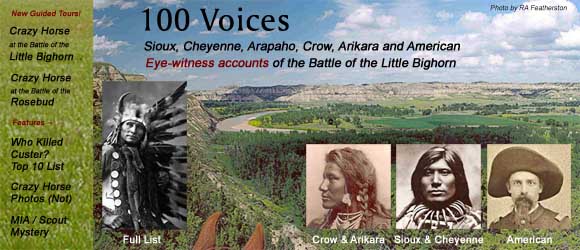
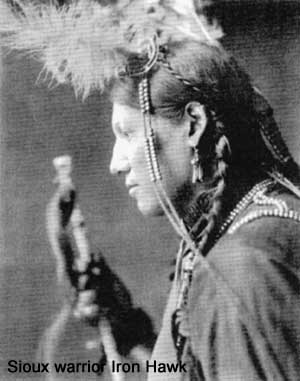 I AM a Hunkpapa, and, as I told you before, I was fourteen years old. The sun was overhead and more, but I was eating my first meal that day, because I had been sleeping. While I was eating I heard the crier saying: "The chargers are coming." I jumped up and rushed out to our horses. They were grazing close to camp. I roped one, and the others stampeded, but my older brother had caught his horse already and headed the others off. When I got on my horse with the rope hitched around his nose, the soldiers were shooting up there and people were running and men and boys were catching their horses that were scared because of the shooting and yelling. I saw little children running up from the river where they had been swimming; and all the women and children were running down the valley.
I AM a Hunkpapa, and, as I told you before, I was fourteen years old. The sun was overhead and more, but I was eating my first meal that day, because I had been sleeping. While I was eating I heard the crier saying: "The chargers are coming." I jumped up and rushed out to our horses. They were grazing close to camp. I roped one, and the others stampeded, but my older brother had caught his horse already and headed the others off. When I got on my horse with the rope hitched around his nose, the soldiers were shooting up there and people were running and men and boys were catching their horses that were scared because of the shooting and yelling. I saw little children running up from the river where they had been swimming; and all the women and children were running down the valley.